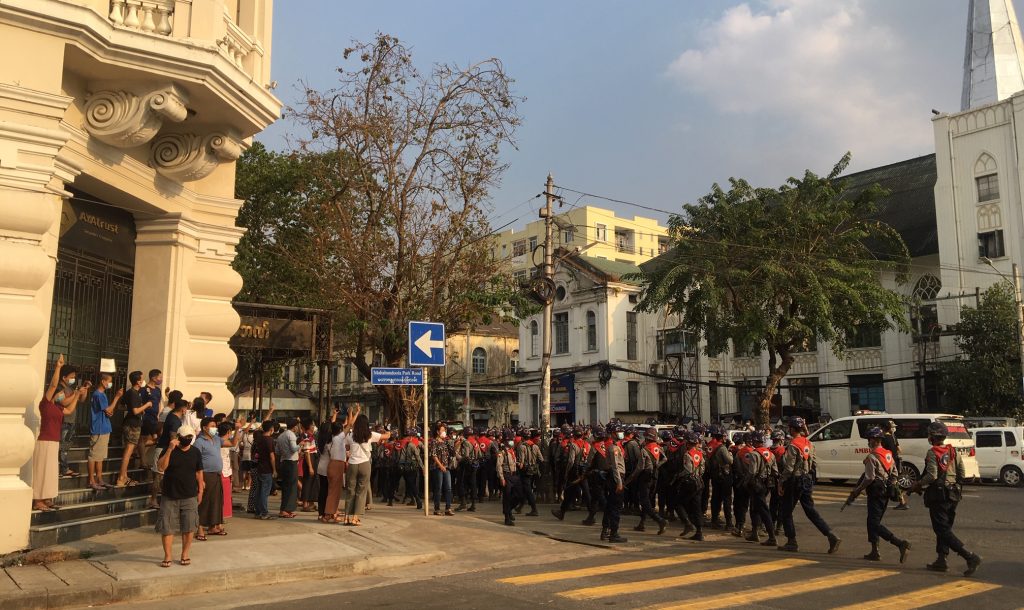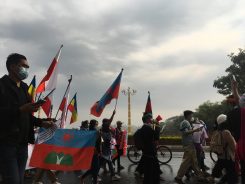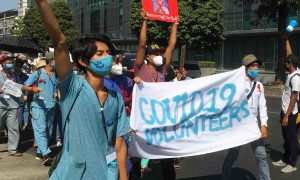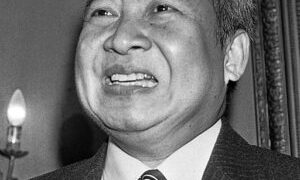A View from the Borderlands: An Interview with Lieutenant Colonel Tar Parn La, Head of Foreign Affairs Department of the Palaung State Liberation Front/Ta’ang National Liberation Army (PSLF/TNLA)
As a juncture of great pressures, the aftermath of the 1.2.2021 coup d’état has shed light on the persistence of geographies of knowing and geographies of ignorance concerning Myanmar’s rebel politics. Besides the subtle (often unintended) reproduction of discourses constructing political heartlands and peripheral remote jungles in the media, some rebel spaces are better understood than others due to easier media access, longstanding connections with actors operating at broader scales, or easier political legibility. Geographies of knowing and geographies of ignorance are tangible also for the so-called “borderlands” or “borderworlds”, which may have their own constructed heartlands: sitting in Laiza or Panghsang is not the same as sitting in Namhsan or Laukkai. As the rebellions in Kachin, Karen, and Rakhine tend to receive more media attention than those in Shan State for example, I interviewed the foreign affairs representative of the Palaung State Liberation Front/Ta’ang National Liberation Army (PSLF/TNLA)—Tar Parn La—concerning the current political landscape in Myanmar. (The interview was conducted via e-mail correspondence; the interviewee’s responses have been lightly edited for clarity.)
Interviewer: Several weeks after the Northern Alliance’s Muse offensive in late 2016, the Shan State Hluttaw approved a proposal that declared PSLF/TNLA and the other members of the Northern Alliance (NA) terrorist organisations. After the 1st of February coup, the majority of people in Myanmar have instead started to look at the Tatmadaw as a terrorist organisation rather than as the incumbent Myanmar state government, as the UN Security Council understands the military.
Are you satisfied with the response of the UN Security Council to the events of the coup by the Tatmadaw? Do you believe the UN Security Council should identify the Tatmadaw as a terrorist organisation?
Lieutenant Colonel Tar Parn La: Since the 2021 February 1st coup in Myanmar, it is hard to say that the response of the UN Security Council and its political implementation has been helpful for the revitalisation of democracy, the rise of civilian government and the fall of Burmese Tatmadaw/military dictatorship in Myanmar.
We believe that the UN Security Council must identify the Burmese Tatmadaw as a terrorist organisation because they brutally murdered over 842 peaceful protesters and arrested 5609 young students, activists, politicians and civilians. The total of 4468 people are still detained by the Tatmadaw in this day [04.06.2021] according to the Source from Assistance Association for Political Prisoners – Burma (AAPP-B). Furthermore, it seems that they will commit more assassination, detaining and torturing the civilians who claim democracy, human rights and federalism.
Thus, we seriously request two issues. First, UN Security should recognise and list the Burmese Tatmadaw as a terrorist organisation and release the statement amongst the international community. Second, as the Myanmar people are discriminated (against) and tortured by the Burmese Tatmadaw, UN Security must seek strategies to involve them [the people of Myanmar and the resistance movements] as a council for protecting the people [i.e. civilian population] from the lethal actions of the Burmese Tatmadaw government.
Interviewer: Do you think that a worldwide arms embargo declared by the UN is needed to pressure the Tatmadaw?
Lieutenant Colonel Tar Parn La: We agree that a worldwide arms embargo declaration of the UN is important and needed to pressure the Burmese Tatmadaw. The reason is that the Burmese Tatmadaw murders the children, women, innocent civilians and the indigenous people with airstrike, rockets and chemical weapons which are restricted by the UN principles. The Burmese Tatmadaw accesses all these weapons from other countries. Thus, UN Security must release a worldwide arms embargo to pressure the Burmese Tatmadaw and protect the Myanmar civilians. If not, the Burmese Tatmadaw legalises the massacre of civilians, peaceful protesters, democratic politicians and indigenous people, including the rape and murder of indigenous women.
If the UN Security Council is not taking the worldwide arms embargo action, it means that the UN Security is aligning with the Burmese Tatmadaw and its government in this day. This can also be interpreted in the sense that UN Security is agreeing with the action of the Burmese Tatmadaw and trying to act against the Myanmar civilians. Thus, we recognise that the action of the worldwide arms embargo can also be one of a possibility for a diplomatic way to save civilian people of Burma.
Interviewer: The Tatmadaw has been targeting peaceful protesters and civilians in an indiscriminate manner. It has deployed army units in the streets, made use of sniper rifles, rifle-mounted grenade launchers, and different sorts of ammunition. It has deployed different tactics to try and repress the different protest movements, such as night curfews, illegal arrests, communication and internet shutdowns, and misinformation campaigns. Much of this violence is familiar to people in the border areas where the Tatmadaw has historically used strategies and tactics such as the 4-cuts, the division of territory into black, brown, and white areas, or campaigns of linguistic, cultural, and institutional forced assimilation of territories and population.
What similarities do you see between the indiscriminate violence on civilians by the Tatmadaw today and the violent strategies deployed by the Tatmadaw in the border areas during the 90s and 2000s? And what differences?
What do nascent solidarities mean for the future of ethno-religious minorities in a post-coup Myanmar?
What kind of solidarity for what kind of Myanmar?
Lieutenant Colonel Tar Parn La: We will say that there are differences between the Tatmadaw’s armed violations on civilians today and those carried out in borderland areas during the 1990s and 2000s. Specifically, the injustices and crimes that are deployed by the Burmese Tatmadaw in the border areas aim to murdering the indigenous/ethnic people and discriminating as well as eliminating indigenous people’s identities. In this day, it is obvious that the Burmese Tatmadaw is murdering, discriminating (against) and eliminating the people who believe in democracy and its cultures. It relates to the political claim by the civilians. However, it is not murdering the Burman ethnicity. Slightly different from this issue, the Burmese Tatmadaw do not recognise the indigenous people/Non-Burman Ethnic Nationality as human beings.
The Burmese Tatmadaw always claims “state sovereignty” and takes the power of the country, and murders the civilians, students, professors, media journalists, democratic politicians and peaceful protesters—since the 1962 coup. This is the culture of the Burmese Tatmadaw politics in Myanmar. Once Tatmadaw General Ne Win said that “they will not shoot to the sky, they will directly shoot the people.” This is the political seeking behaviour of Burmese Tatmadaw Junta. They do not care or respect the international laws, human rights and humanity, which is the same behaviours of the Tatmadaw government since 1962.
Interviewer: National and international media have at times represented the Ta’ang rebel movement as an organisation engaging in criminal activities and as a proxy of different actors (such as KIO/A, UWSP/UWSA, or Chinese authorities). In this sense PSLF/TNLA’s histories and political culture are usually less understood than the histories and political cultures of other Ethnic Armed Organisations (EAOs) in Myanmar. In August 2019 the Brotherhood Alliance launched coordinated attacks in Shan State that disrupted highway traffic, cross-border trade with China and led to financial losses. And yet, stability, especially economic and military stability, is assumed to be at the heart of what is described as Chinese influence/pressure on EAOs in northern Shan State.
What do you think about media representations of PSLF/TNLA as a criminal organisation or a proxy of Chinese authorities?
Lieutenant Colonel Tar Parn La: The representations of those media demonstrate that they are not able to cover the situation in Ta’ang regions. For many years, the military government as well as semi-democracy NLD government have been restricting and banning the media institutions to enter and collect empirical data. That is why, PSLA/TNLA would like to call for the national and international media institutions to visit our land and find out the real situation. So, they can freely visit and study about us and we are also ready to cooperate with the media institutions.
Regarding the second question, PSLF/TNLA has two main points to talk about the relationship with China.
Firstly, the China and Ta’ang lands are geographically and strategically connected as most of the Ta’ang people live along the borderlands between Mu-se, Namkham (Myanmar) and Ruili area, Yunnan Province, China. Thus we have a social relationship with the Chinese government to have protection for our Ta’ang people. Secondly, many local products have to be traded and sold mainly on the Chinese side. The livelihood of the Ta’ang people has to rely on China’s markets for local products: tea, charcoal, rice and others. That is why we have to build a close relationship with China. This year, as the China shut down and restricted the borderland gates, many fruits, tea and rice could not be traded and sold on the China side. Thus, the Ta’ang people are facing livelihood insecurity this year. We, PSLF/TNLA, encourage all the media institutions to study the drivers and phenomenon of the local situation concerning China and Ta’ang relations in borderland areas in Myanmar.
Interviewer: The Committee Representing the Pyidaungsu Hluttaw (CRPH) has taken steps towards the formation of the National Unity Government (NUG) and the National Unity Consultative Council (NUCC), of which some EAOs are part.
What is the position of PSLF/TNLA’s regarding the process started by the National Unity Government (NUG)?
Lieutenant Colonel Tar Parn La: This is an interesting period in Myanmar. In 2021, while the elected government and parliamentarians started the first parliament event, the Burmese Tatmadaw arrested important leaders, including Daw Aung San Su Kyi and President U Win Myint, and took the power of the country. Thus many young generations and civilians are not accepting this situation and they are peacefully protesting against the coup of Burmese Tatmadaw and for democracy since February 1st, 2021.
However, the Burmese Tatmadaw, known as the coup government, are forcefully cracking down and murdering the peaceful protesters. Further, they also brutally arrest the young generation, students, professors, activists and Democratic politicians who claim democracy and federalism. Most of the well-known politicians and activists have been killed by the Burmese soldiers.
In this situation, the elected NLD government and parliamentarians formed a “Committee Representing Pyidaungsu Hluttaw (CRPH)” to restore and develop democracy in Myanmar. Then they inaugurated and initiated the National Unity Government (NUG) and People’s Defense Force (PDF) to protect the civilians from the discrimination of the Burmese Tatmadaw government. This is a civilians’ policy, and it is not different from PSLF/TNLA. Thus, the PSLF/TNLA have the same political beliefs with the oppressed civilians and it creates a chance and responsibility to protect these people. In PSLF/TNLA region, we are operating to protect the civilians and their livelihood security.
Interviewer: In the last months the RCSS/SSA-S has publicly condemned the coup d’état, but it has continued to fight with PSLF/TNLA and SSPP/SSA-N in northern Shan State. A few weeks ago, in particular, there was fighting in the area of Mann Lee village (Namtu Township) and the village has been burnt down.
What do you think about the current situation? Why are RCSS/SSA-S and PSLF/TNLA and SSPP/SSA-N continuing to clash with each other even in the context of the coup?
Lieutenant Colonel Tar Parn La: Although the RCSS condemns the coup of Burmese Tatmadaw, they are continuing to invade the territories of SSPP/SSA and PSLF/TNLA and create armed conflicts. This is the time to battle the common enemy. However, the RCSS is having armed conflicts with us. The PSLF/TNLA did not prepare and expect to start armed conflicts with RCSS. We want RCSS to return to their territory in eastern Shan State and operate as before they signed NCA agreement. Then there will be a peaceful situation in Ta’ang and Shan land in Northeast Myanmar.
The existence of RCSS in Northeast Myanmar generates problematic results for the local people. In April and May 2021, the RCSS detained, arrested and murdered the local people and burned down the villages. Over one hundred households have been burned down by the RCSS. On this day, the local villagers are facing livelihood struggles and they cannot find the solutions for food and shelter. Thus PSLF/TNLA requests the International Community to address the brutal violence, inhumanity and human rights abuses of RCSS. Furthermore, the RCSS must take responsibility and accountability regarding their lethal action on civilians and villagers.
The following table shows the household lists that were burnt by RCSS Force [N.B. figures were collected by the public relations and information departments of PSLF/TNLA]:
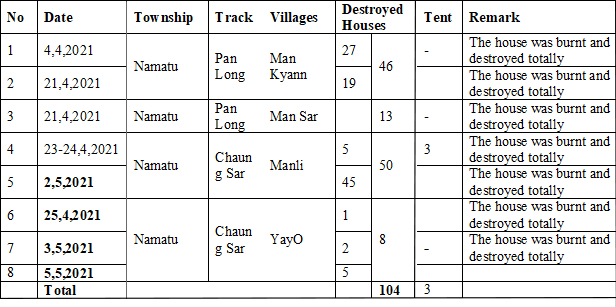
Interviewer: There have been informal discussions and rumours about the possibility to constitute a Federal Union Army in Myanmar.
What do you think about the possibility to form a Federal Union Army? Should it be formed through ethnic-based recruitment and ethnic-based components? What alternatives to this do you envisage to a division along ethnic lines, if any?
Lieutenant Colonel Tar Parn La: The establishment of the Federal Union Army will have a long journey. Before reaching this goal, we need to defeat the Burmese Tatmadaw and its dictatorship system in Myanmar. After that, we can embark on the practical formation of a Federal Union Army. In this day, it is seriously important to take down the Burmese Tatmadaw and its dictatorship structure as fast as possible in Myanmar.
All the ethnic people are forming their armed groups to protect their lands and territories from the Burmese Tatmadaw’s domination. So, as different ethnic groups are liberating the Burmese Tatmadaw, there will be a change in this period. However, we believe that if all the ethnic armed groups have a strong agreement and the same objective, the outcome will be result in a beautiful destination for a federal democratic country.
We, PSLF/TNLA, value human dignity, respect multiculturalism and the bundle of rights as well as federal and democratic spirit. That is why we want to get self-determination for the sustainable development of our ethnic/indigenous Ta’ang people. It has been over seventy years under the Burmese Tatmadaw government; our Ta’ang people are having less opportunity in socioeconomic, politics and education. We, Ta’ang people, are marginalised and excluded by the Burmese Tatmadaw government for a long time. Therefore, the PSLF/TNLA are responsible and accountable to protect our ancestors’ lands and territories which are inherited by our Ta’ang ancient people.
 Facebook
Facebook  Twitter
Twitter  Soundcloud
Soundcloud  Youtube
Youtube  Rss
Rss 